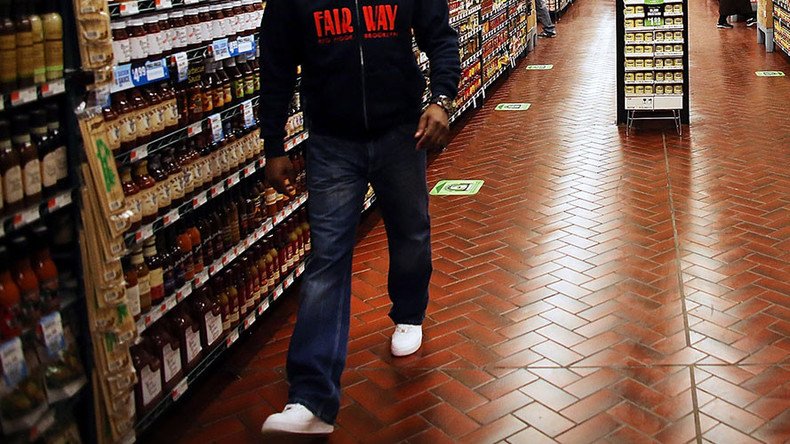Hunger drives US teens to swap sex for food, commit crimes – research

Hunger is driving desperate US teenagers as young as 13 to search for ways to feed themselves and their families, with many resorting to crime or providing sexual favors in exchange for food and basic supplies, according to a study published Monday.
Researchers from the Urban Institute, a Washington-based economic and social policy research group, paired up with Feeding America – a US network of food banks – in an attempt to find out “how food insecurity affects teenagers.”
They created two focus groups – one male, one female – in the 10 poorest communities across the States, including those in major cities such as Chicago and Los Angeles, as well as in some rural towns. Researchers interviewed 193 boys and girls aged 13 to 18, all anonymously, over the course of three years – and were deeply concerned at the results.
“What emerged was a portrait of impossible choices imposed upon teenagers who are forced to transition into adulthood much too quickly,” the report states.
“When faced with severe food insecurity, teens can begin to feel the weight of adult responsibilities. But like their parents, teenagers [from low-income communities] have limited jobs available to them within their communities. It’s in these moments of need when some teens make the choice to help their families stock the pantry by earning money outside of the legal economy.”
Teens at all the 10 study locations told researchers numerous stories of how they themselves or some of their peers had committed minor crimes such as shoplifting, or more serious offenses such as selling drugs, in order to put food on the table. Many described “selling their body” or “sex for money” as a way to get something to eat.
“Often this takes the form of ‘transactional dating,’ meaning a teen regularly sees and has sex with someone, often a significantly older man, in exchange for meals, material goods, or cash,” researchers found.
“You’re not even dating,” a girl in Portland, Oregon, is cited by the report as saying. “They’ll be like, ‘I don’t really love him, but I’m going to do what I have to do.’”
A boy in rural North Carolina also described the strategy, saying: “When you’re selling your body, it’s more in disguise. Like if I had sex with you, you have to buy me dinner tonight… that’s how girls deal with the struggle… That’s better than taking money because if they take money, they will be labeled a prostitute.”
New research: Why do some teens engage in risky behavior? Hunger. https://t.co/QhGR78sB8tpic.twitter.com/wpzLSyVeUf
— Urban Institute (@urbaninstitute) September 12, 2016
The report also cites boys from Los Angeles, who described how middle school girls give out flyers to advertise their sexual services, and a girl from Chicago, who told researchers about an 11-year-old sixth-grader who dropped out of school to work in the sex trade.
Senior fellow at the Urban Institute and lead author of the report, Susan Popkin, spoke to the Guardian about the findings. She said it was particularly disturbing that the majority of stories in all focus groups were those of girls swapping sex for goods.
“With the boys there was a lot of hustling and shoplifting or maybe stealing a car stereo or something small they could sell. Getting pushed into drug dealing, sometimes getting pulled into gangs […] I find it particularly disturbing that all the kids in almost every focus group were aware about what was happening to the girls – they knew the story about girls dating older guys or being exploited.”
"It’s a sexual exploitation. To hear it from stably-housed kids in the United States is shocking and even if it’s only a handful of kids, it should be something that we’re paying attention to, that there are kids that desperate,” Popkin told the newspaper.
As a less common practice they noted at two of the 10 locations, researchers described cases when teens fail in school or get arrested intentionally, thus ensuring they will have continued access to food at a legal institution.
“It might not be the best food, might not be the best place to be, but it’s a roof over your head. And every single day they eat breakfast, lunch, and dinner,” one teenage girl in Portland was cited as saying.
Researchers found that what they dubbed as “food insecurity” is widespread across the nation, along with strategies used by teens to tackle it. They claimed that hunger is in many cases the root cause of teen crime and suggested educators and police should be trained to recognize the trauma experienced by teens who suffer from it, as they often hide this problem as they feel ashamed.
Some 15.8 million American households are currently food insecure, reports @JacqEHowardhttps://t.co/3I89ubS4TDpic.twitter.com/8gucEoE4xp
— Urban Institute (@urbaninstitute) September 9, 2016
But apart from a variety of recommendations for policy and practice, such as “increasing nutrition assistance benefits [and] creating more and better youth job opportunities,” researchers see tackling poverty across the US as the main way to fix the problem.
“In the long term, the only way to end teen food insecurity is to address its root cause – family poverty – by improving access to jobs, providing better access to opportunity-rich neighborhoods, and strengthening the safety net when parents cannot earn enough to cover basic needs,” the study concludes.














